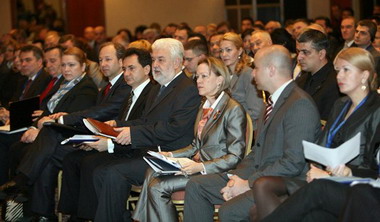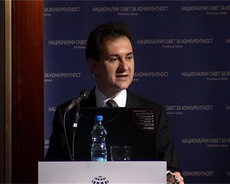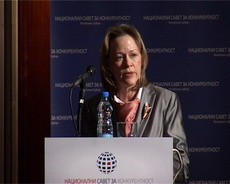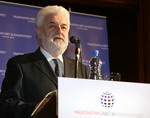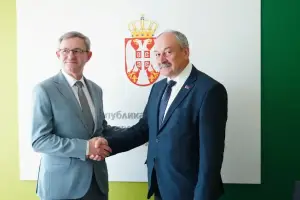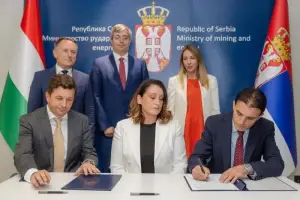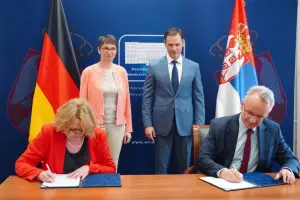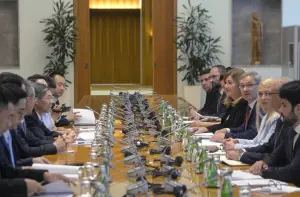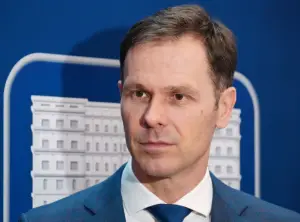Q:
A:
Faster economic growth only with altered structure of economy
Belgrade,
29 March 2010
Serbian Prime Minister Mirko Cvetkovic said today that the unfavourable structure of the Serbian economy and a high participation of the services sector, which produces non-tradable goods in GDP, are among the reasons for Serbia’s low competitiveness.
Speaking at the “Towards a More Competitive Serbia” conference, Cvetkovic said that poor competitiveness is the consequence of an inefficient antimonopoly policy and legal insecurity.
The projected GDP growth of 2% in 2010 heralds economic recovery, but preconditions for faster economic growth can be created only by changing the structure of our economy, the Prime Minister said.
Telecommunications and the financial and retail sectors made up over 80% of our GDP growth in the period 2003–2008, which shows that Serbia has to change its economic structure, he explained.
In order to improve economic competitiveness, at the proposal of the National Competitiveness Council, the government adopted 38 improvement measures in infrastructure, energy efficiency, efficiency in the goods and labour markets, human capital development and public administration efficiency, Cvetkovic said.
These measures will remove administrative obstacles and secure the enforcement of the Law on the protection of competition, the Law on electronic signature and the Law on construction and development. They propose harmonisation of local and utility taxes with those in the region, he explained.
He said that according to the latest report on global competitiveness, drafted by the World Economic Forum, Serbia is 93rd out of 133 countries, which is an unsatisfactory result, compared to countries in the region.
The projected GDP growth of 2% in 2010 heralds economic recovery, but preconditions for faster economic growth can be created only by changing the structure of our economy, the Prime Minister said.
Telecommunications and the financial and retail sectors made up over 80% of our GDP growth in the period 2003–2008, which shows that Serbia has to change its economic structure, he explained.
In order to improve economic competitiveness, at the proposal of the National Competitiveness Council, the government adopted 38 improvement measures in infrastructure, energy efficiency, efficiency in the goods and labour markets, human capital development and public administration efficiency, Cvetkovic said.
These measures will remove administrative obstacles and secure the enforcement of the Law on the protection of competition, the Law on electronic signature and the Law on construction and development. They propose harmonisation of local and utility taxes with those in the region, he explained.
He said that according to the latest report on global competitiveness, drafted by the World Economic Forum, Serbia is 93rd out of 133 countries, which is an unsatisfactory result, compared to countries in the region.
Deputy Prime Minister for EU integration and Minister of Science and Technological Development Bozidar Djelic stated that Serbia’s goal is to move forward on this list and to become one of the top 70 countries within two years.
Djelic, who is also President of the National Competitiveness Council, said that Serbia’s low competitiveness is primarily the result of the brain drain, an inefficient antimonopoly policy and the lack of adequate infrastructure.
Stopping the brain drain is the priority of the Serbian Scientific and Technological Development Strategy, adopted late this February, Djelic stressed recalling that in the period 1990–2000 around 73,000 people with higher education left Serbia.
He said the government adopted key laws regarding the protection of competition and antimonopoly behaviour, including the Law on the protection of competition which secures the liberalisation of trade and equal status for all participants in the market.
The government also prepared draft laws on consumer protection, which will be adopted during 2010, he added.
Djelic stressed that Serbia expects over €2 billion in infrastructure investment before 2012, adding that €1.6 billion has been secured for the completion of Corridor 10.
He also said that funds from Telekom Srbija’s privatisation will be used for infrastructure construction, adding that the project to build an underground railway in Belgrade is expected to trigger investments exceeding €1 billion.
Djelic recalled that the Ministry of Economy and Regional Development is conducting a comprehensive reform of regulations, within which 212 recommendations were adopted last year. These measures are to help Serbia save €64 million a year, he said, adding that the ministry is working on another 122 recommendations to save an additional €122 million a year.
Djelic, who is also President of the National Competitiveness Council, said that Serbia’s low competitiveness is primarily the result of the brain drain, an inefficient antimonopoly policy and the lack of adequate infrastructure.
Stopping the brain drain is the priority of the Serbian Scientific and Technological Development Strategy, adopted late this February, Djelic stressed recalling that in the period 1990–2000 around 73,000 people with higher education left Serbia.
He said the government adopted key laws regarding the protection of competition and antimonopoly behaviour, including the Law on the protection of competition which secures the liberalisation of trade and equal status for all participants in the market.
The government also prepared draft laws on consumer protection, which will be adopted during 2010, he added.
Djelic stressed that Serbia expects over €2 billion in infrastructure investment before 2012, adding that €1.6 billion has been secured for the completion of Corridor 10.
He also said that funds from Telekom Srbija’s privatisation will be used for infrastructure construction, adding that the project to build an underground railway in Belgrade is expected to trigger investments exceeding €1 billion.
Djelic recalled that the Ministry of Economy and Regional Development is conducting a comprehensive reform of regulations, within which 212 recommendations were adopted last year. These measures are to help Serbia save €64 million a year, he said, adding that the ministry is working on another 122 recommendations to save an additional €122 million a year.
US Ambassador to Serbia Mary Warlick said she believes that Serbia can once again become one of the major instigators of regional economic growth, but added that bold and decisive measures are required for this.
However, it will all be worthwhile once you are rewarded by increased exports, more jobs and investment, Warlick said.
The Ambassador stressed that in order to boost Serbia’s competitiveness, the entire society must be committed to implementing the recommendation of the National Competitiveness Council, and the US will continue to endorse these efforts.
However, it will all be worthwhile once you are rewarded by increased exports, more jobs and investment, Warlick said.
The Ambassador stressed that in order to boost Serbia’s competitiveness, the entire society must be committed to implementing the recommendation of the National Competitiveness Council, and the US will continue to endorse these efforts.

